- Home
- Burt L. Standish
The Swan and Her Crew Page 9
The Swan and Her Crew Read online
Page 9
CHAPTER VII.
A Trial Sail.--Preparing for a Cruise.--Charging a Reed Bed.-- An explosion of Birds.--The First Adventure.-- Orange-Tip Butterfly.--No Salt.--How Salt is obtained.
The project of the cruise was not allowed to drop. The more the boysthought about it the more they determined to take it. The first thing todo was to obtain the consent of their elders. Mr. Merivale had no greatobjection to it. Sir Richard Carleton was so pleased with the rapidimprovement in the health and spirits of his son that he would haveconsented to anything he proposed. Indeed, he was so anxious to help theboys in all their undertakings, that he would have spoilt them too muchhad it not been for the advice of Mr. Merivale, who said to him--
"Don't let the boys think they can have anything they like for theasking, or you will spoil their independence of character. Depend uponit they will find far more delight in making things for themselves thanin having them bought for them, and it will do them more good."
Sir Richard saw the wisdom of this advice, but he insisted upon givingthem a book on botany; and one day when the boys went into theboat-house they saw on the shelves a nicely bound copy of Ann Pratt's_Flowering Plants of Great Britain_ in six volumes. This was a greatacquisition to them, and Jimmy, in the fulness of his delight, got uponthe table with a volume under each arm, and executed a war-dance ofexultation.
The consent of the ladies was far harder to obtain. Mrs. Brett said shewould see what Mrs. Merivale said; and Mrs. Merivale was afraid that itwould not be safe, and for some days she hung back, and would not say"yes" or "no," although Frank pleaded hard with her. His mother was verymuch afraid of the water. She did not like to see yachts heeling over asif they were going to be upset, and she thought the boys were not oldenough to manage a yacht by themselves. Frank at last persuaded her totake a sail in the _Swan_, and see for herself how safe it was, and aday was fixed when everyone should have a sail on the Broad, and try thecapacities both of the yacht and of the boys as sailors. When the dayarrived, however, Frank put them off, saying it was not convenient. Mr.Merivale smiled as he guessed the reason. It was blowing a stiff breeze,and sailing on such a day would not reassure a timid woman. The nextday, however, was fine, and came with a gentle breeze, just rippling thesurface of the water, and with a confident air, Frank got his party onboard. The sail was quite a success. The yacht glided about on an evenkeel, and Frank, who was at the helm, carefully avoided any abruptmotion in tacking or gybing.
"You see it is quite safe, mother," said he.
"Yes, my dear, I suppose it is, and I suppose you must go, as you haveset your heart upon it; but how can you possibly think of sleeping inthat small cabin?"
"One of us will sleep at each side, and the third will sleep in ahammock stretched across the middle."
"But you will be suffocated, dear."
"Have no fear, mother, we will see to the ventilation."
So they obtained permission to go, and, as time was an object, they setto work with great vigour to prepare for their voyage. They made ahammock out of an old sail. Their beds were formed of cushions placed onthe bunks on either side of the cabin. To prevent the necessity oftucking in their bedclothes they adopted a well-known dodge ofyachtsmen; which is to double the sheets and blankets, and sew thesides and bottoms together, so as to form a bag into which they couldcreep. They took fishing-tackle with them, and also their old muzzleloader. Dick took his butterfly net, Jimmy a quantity of newspapers inwhich to dry plants, and Frank an opera-glass, with which to watch themovements of birds at a distance. Frank also took care to see to theeating department, and with his mother's help he got a very fair stockof provisions on board. The day at length arrived for their departure.It was the Monday in the last week of May. At eight o'clock in themorning they bade farewell to Mary and Florrie, who had come to see themoff, hoisted their sails, and away they went before a light breeze fromthe northward. A cheer broke from them as they found themselves fairlyafloat, and the boat-house grow smaller in the distance behind them, andthe waving handkerchiefs of the two girls could be seen no longer. Itwas a beautiful morning, and their spirits were high. Holidays, sport,and adventure lay before them, a stout boat under them. There were nothree happier boys in the world.
They sailed slowly through the narrow outlet of Hickling Broad intoWhiteslea Pool, and through another narrow passage into Heigham Sounds.
A dyke called the Old Meadow Dyke ran from the Broad on the left intoHorsey Mere; and Frank proposed making a detour along this and exploringHorsey Mere, but the other boys were too anxious to get on. It was toonear home to begin to explore. In the middle of Heigham Sounds, which isa good sized sheet of water, was a large bed of reeds, such as islocally called a 'rond.'
"Let us go slap-dash into that. We shall be sure to find some nests,"said Frank.
"All right," said both Jimmy and Dick. So Frank put the helm up, and theyacht drove on before the wind, surging through the rustling reeds,which bowed and bent before her, until she came to a standstill wellinto the heart of the rond.
"Down with the sails," said Frank, and the halyards were let go and thesails came down with a run. As the yacht crashed into the rond there wasquite an explosion of birds from it. Water-hens, coots, and marsh-titsflew out on both sides, and from the centre of it rose a little duckwith a bright, chestnut-coloured head and neck.
"That is a teal," said Frank, "we shall find her nest here, so lookcarefully."
They jumped into the shallow water, having first taken off their shoesand stockings, and began to hunt about for nests. They speedily foundseveral coots' and water-hens' nests, and also a dab-chick's; but theywanted none of these, and continued their search for the teal's nest. Atlast--
"Here it is," said Dick delightedly, and sure enough there the nest was,in a small bush which grew in the very centre of the rond, where thesoil was pretty firm. The nest was large and thickly lined withfeathers, and it contained twelve cream-coloured eggs. They took six ofthem, and then, satisfied with their spoil, they went back to theiryacht, and tried to push her off again. But this was no easy task. Theypushed and pushed, until they were exhausted, and the only effect theirpushing seemed to have was to push their own legs deeper into the mud.The yacht refused to be moved.
"Well, this is a pretty go, to be wrecked at the very beginning of ourcruise! We have run her almost high and dry. How they will laugh at usat home!" said Jimmy.
"They sha'n't have the chance of doing that. We will get her off somehowor other. We ought to have gone to leeward of the rond, and run her upin the wind's eye into it, and then we could have backed her off withthe sails," said Frank.
"Live and learn," said Dick. "I vote we strip and go overboard again andtry to lift her off. We can get the oars from the boat, and use them aslevers."
This was undoubtedly the best thing to do, and although the water wasnot over warm, they took off their clothes and worked and pushed away,until they made the mud around the yacht as soft as a pudding, andthemselves as black as negroes. Then the yacht moved a little, andputting forth all their strength they shoved her back into deeper water.Not waiting to dress themselves, they ran the sails up and steered awayfor the Kendal Dyke at the south-east end of the Broad. They meant tostay at the mouth of the Broad to bathe and dress. There was no one tosee them, so it did not matter. As they neared the mouth of the dyke, totheir great dismay a yacht with several people on board came out of it.The people stared in blank astonishment at the strange double-bodiedyacht and her still stranger crew. Jimmy and Dick dived at once intothe cabin. Frank could not leave the helm, and yet could not stay wherehe was; so without further thought he plunged into the water at thestern of the yacht, and, holding on by the rudder, he contrived to keepher on her course until Jimmy reappeared with something thrown over him,and took hold of the tiller. When they came to an anchorage in asecluded spot among the reeds, they bathed and dressed.
"Well," said Dick, "if we go on having adventures at this rate, we shallhave plenty to tell when we
get home."
"I like adventures, but these are not the sort I like," said Jimmy.
"Well, never mind, better luck next time," said Frank, soothingly.
Sailing through Kendal Dyke, which in places was so narrow that the_Swan_ brushed the reeds on both sides as she passed through, theyreached the Hundred Stream, and, turning to the south-westward, theysailed, with no further adventure, until they came to Heigham Bridge,where they had to lower their masts in order to get through. While Frankand Jimmy did this, Dick took his butterfly net, and went after anorange-tip butterfly, which he saw flying past. This butterfly is one ofthe first which makes its appearance in the spring, and it is one of theprettiest. It looks as if a bunch of red and white rose petals had takento themselves wings and fled. It is a small butterfly, having anorange-red tip on the ends of its forewings. The male only has thisornament. The female has only a greyish black tip. The under surface ofthe wings of this pretty insect is no less beautiful than the upper. Itis white, with bright green marblings, or what appear as bright green tothe naked eye. When looked at through the microscope it will be foundthat the green appearance is caused by the mixture of black andbright-yellow scales. (I suppose that most of my boy readers will knowthat the dust which is so easily rubbed off a butterfly's wings is inreality a coating of scales arranged one over the other like feathersand of very exquisite shapes.) The caterpillar of the orange-tip isgreen, with a white stripe on each side, and the chrysalis is verypeculiar in shape, tooth-like, and pointed at both ends.
ORANGE-TIP BUTTERFLY.]
Dick was a long time away; and when he came back, flushed withexercise, he had no less than eight orange-tips in his net, which heproceeded to kill and set there and then.
They sailed on very slowly, for the breeze had fallen, until they cameto the Thurne Mouth, and then they turned up the Bure until they came toSt. Benedict's Abbey, the ruins of which stand on the northern bank ofthe river. Here they determined to camp for the night, and accordinglyran their boat into a marshy creek, and made her fast to the reeds. Theywere much amused at the remarks of the people whom they passed, whetheron the bank or on board the wherries and yachts. The like of the _Swan_had never before been seen on Norfolk waters. She was a _rara avis interris_ and excited any amount of appreciatory and depreciatory comment.
After making the boat snug and comfortable, the boys proceeded to cooktheir dinner. They brought out from the lockers some cold beef and ham,and boiled the potatoes in a small tin saucepan over the spirit-lamp.The meal was soon ready, and they sat down to it with most excellentappetites.
"Where have you put the salt, Frank?" asked Dick.
"The salt?" replied Frank, thoughtfully.
"Yes, the salt."
"Well, let me see. Dear me, we must have forgotten it."
"But Frank, how can you--how can anybody eat beef without salt?" saidJimmy reproachfully.
"Never mind, we will get some to-morrow," said Frank, looking guilty.
"There are no shops about here, and there are no salt-mines in themarsh," said Jimmy, who refused to be comforted.
"Talking about salt-mines, have you ever been down one?" said Frank, whowas eager to turn the subject.
"No; have you?"
"Yes, and a jolly sort of place it is."
"Then tell us all about it as a punishment."
"It was at Northwich, in Cheshire, last year, when I was on a visit tomy uncle. We drove over one day to look at the mines. They get anenormous quantity of salt from that district, and it is of two kinds,the white table salt and that dark lumpy salt they put in fields forcattle. They get the white salt from brine-pits, which are full of saltwater. The water is pumped up and put into basins until it evaporates,and the white salt is left behind. There must be big holes in the earthfilled with salt water, for as it is pumped away the surface of theearth caves in, and the houses lean against each other in a verytumble-down sort of fashion. The brown or rock-salt is dug out of mines,and we went down one of these. My cousin and I went down in a tub hardlylarge enough to hold us, and a workman clung to the rope above ourheads. The shaft was dirty, narrow, and crooked, and we bumped finelyagainst the sides. I didn't like it at all, I assure you; and when wecleared the shaft and hung suspended over a vast cavern, at the bottomof which were some dim lights, I felt rather in a funk. The man belowreached up to us with a long pole, and pulled us away from the end ofthe shaft for fear of falling stones, and then we were lowered to theground, and stepped out of the bucket and looked about us. We were in avery large cave, the roof of which was supported by immense squarepillars of the salt rock. It was brown, of course, but it was quitetranslucent, and the light gleamed from it very prettily. Our guide lita piece of magnesium-wire, and I never saw anything so magnificent in mylife. The whole place seemed set with precious stones, and the dirty,half-naked men, leaning on their tools, looked as picturesque as youcould well imagine. Then one of the men had finished boring a blasthole, and we waited while he filled it with powder and fired a shot. Weall huddled in one corner of the cave, and then there was such a roarand smoke! The rock under our feet heaved and shook, and pieces of rockand stone flew about far too near for my liking."
"I never knew how salt was got before," said Dick.
"Nor I," said Jimmy; "and as Frank has told us so well we will forgivehim for forgetting the salt."

 Dick Merriwell Abroad; Or, The Ban of the Terrible Ten
Dick Merriwell Abroad; Or, The Ban of the Terrible Ten Wild Adventures round the Pole
Wild Adventures round the Pole Storm-Bound; or, A Vacation Among the Snow Drifts
Storm-Bound; or, A Vacation Among the Snow Drifts In the Yellow Sea
In the Yellow Sea Frank Merriwell's Triumph; Or, The Disappearance of Felicia
Frank Merriwell's Triumph; Or, The Disappearance of Felicia Treasure of Kings
Treasure of Kings Bert Wilson's Twin Cylinder Racer
Bert Wilson's Twin Cylinder Racer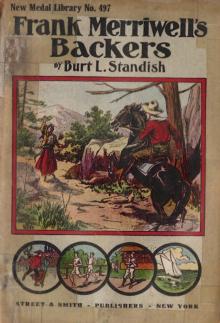 Frank Merriwell's Backers; Or, The Pride of His Friends
Frank Merriwell's Backers; Or, The Pride of His Friends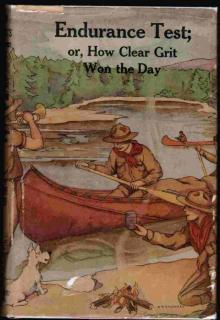 Endurance Test; or, How Clear Grit Won the Day
Endurance Test; or, How Clear Grit Won the Day Great Hike; or, The Pride of the Khaki Troop
Great Hike; or, The Pride of the Khaki Troop The Swan and Her Crew
The Swan and Her Crew A cup of sweets, that can never cloy: or, delightful tales for good children
A cup of sweets, that can never cloy: or, delightful tales for good children Frank Merriwell's Bravery
Frank Merriwell's Bravery Frank Merriwell Down South
Frank Merriwell Down South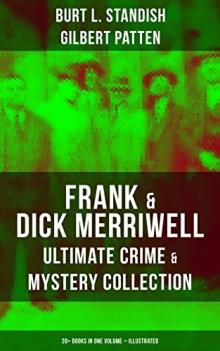 Dick Merriwell's Trap; Or, The Chap Who Bungled
Dick Merriwell's Trap; Or, The Chap Who Bungled The Trail of the Seneca
The Trail of the Seneca Wild Life in the Land of the Giants: A Tale of Two Brothers
Wild Life in the Land of the Giants: A Tale of Two Brothers From Squire to Squatter: A Tale of the Old Land and the New
From Squire to Squatter: A Tale of the Old Land and the New The Cruise of the Snowbird: A Story of Arctic Adventure
The Cruise of the Snowbird: A Story of Arctic Adventure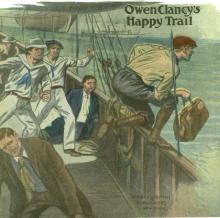 Owen Clancy's Happy Trail; Or, The Motor Wizard in California
Owen Clancy's Happy Trail; Or, The Motor Wizard in California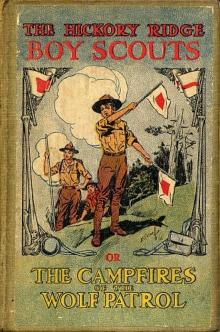 Boy Scouts: Tenderfoot Squad; or, Camping at Raccoon Lodge
Boy Scouts: Tenderfoot Squad; or, Camping at Raccoon Lodge Sing a Song of Sixpence
Sing a Song of Sixpence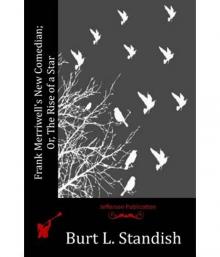 Frank Merriwell's New Comedian; Or, The Rise of a Star
Frank Merriwell's New Comedian; Or, The Rise of a Star The Sa'-Zada Tales
The Sa'-Zada Tales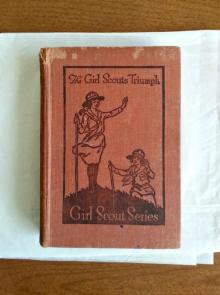 The Girl Scout's Triumph; or, Rosanna's Sacrifice
The Girl Scout's Triumph; or, Rosanna's Sacrifice Wild Adventures in Wild Places
Wild Adventures in Wild Places Fairies I Have Met
Fairies I Have Met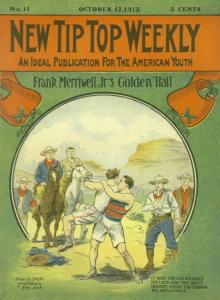 Frank Merriwell's Son; Or, A Chip Off the Old Block
Frank Merriwell's Son; Or, A Chip Off the Old Block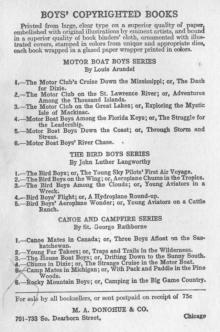 Motor Boat Boys' River Chase; or, Six Chums Afloat and Ashore
Motor Boat Boys' River Chase; or, Six Chums Afloat and Ashore Frank Merriwell's Athletes; Or, The Boys Who Won
Frank Merriwell's Athletes; Or, The Boys Who Won Bart Keene's Hunting Days; or, The Darewell Chums in a Winter Camp
Bart Keene's Hunting Days; or, The Darewell Chums in a Winter Camp Captain June
Captain June